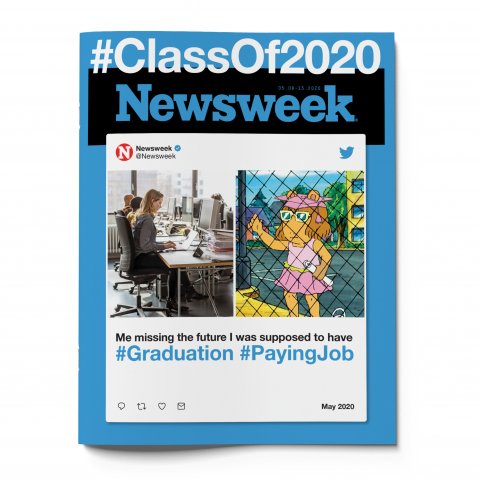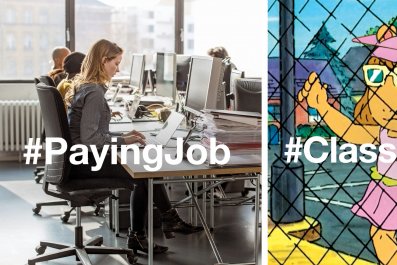For this year's college seniors, the Covid-19 pandemic has already upended their final semester and graduation ceremonies, and now threatens their first steps into adulthood. Internships they counted on have been delayed or rescinded. Job offers that seemed sure to come in January are now nonexistent. In fact, a recent study of 800 college students found that three quarters had their jobs cancelled, turned remote, or delayed because of the coronavirus.
For people who graduated during the financial crisis, what the Class of 2020 is about to experience is eerily familiar—minus the unprecedented global health crisis part, of course. During the Great Recession, the unemployment rate soared to 19.2 percent among people aged 16 to 24, nearly double the peak rate of the general population. Yet despite the ensuing hardships, a college degree proved to be a saving grace: By 2018, millennials with a college degree had largely caught up, salary-wise, to where Gen Xers were at their age, according to Pew Research.
Who better then to offer advice to today's newly-minted B.A.s than career coaches and financial advisors who graduated during the last economic meltdown and other major crises yet emerged with strong careers, solid salaries and their sanity intact? Here are practical tips from five such experts, who lived through and survived graduating into chaos.

This is hard. Take care of yourself
When Lauren McGoodwin graduated in 2009, the U.S. was in the midst of shedding 8.7 million jobs within two years. "I graduated with zero prospects and had to move back home," says the founder and CEO of Career Contessa. "I felt this extreme expectation hangover, like I've checked all the right boxes, done all the right things, but I wasn't getting what I felt I was promised at the end. I was very hard on myself."
Show yourself compassion, McGoodwin says, and ensure you're looking after your emotional wellbeing. After all, nothing can ding your confidence more than a job search where you're constantly being rejected or failing to even hear back. Focus on building a strong support system and small tasks that will help you feel more in control, like connecting with people in your field from your school's alumni network and optimizing your LinkedIn profile.
You may not land your dream job...and that's OK
With millions of Americans unemployed or furloughed, the competition for roles, if a company is even hiring, will be fierce. So sadly, no, the first job you take after graduation may not be the exact role you want or in your preferred industry, but that doesn't mean you're wasting your time.
"Get out of the mindset that it has to be a perfect job. You can start anywhere and ultimately get where you want to be," says workplace expert Lindsey Pollak, who learned her job hunting skills while looking for work in New York City right after 9/11. "Any job can teach you something valuable for your career moving forward."
Denver financial planner Trent Porter is a perfect example. After Porter graduated in 2008, he took a part-time job preparing taxes, something he had no interest in, to help pay the bills. The unwanted experience, though, actually gave him an edge over other financial planners who lack deep tax know-how and the firm he worked for still sends him clients over a decade later.
"Be open to any job that is legal and will pay you," advises Erin Lowry, author of Broke Millennial: Stop Scraping by and Get Your Financial Life Together, and a 2011 college grad.

Don't spray and pray
Avoid being one of those applicants who blindly applies to hundreds of positions online, often with the same resume and cover letter, relying on quantity, rather than quality, to land a job—what some career counselors refer to as spraying and praying. You're better off spending time researching the company that's hiring and tailoring your resume and cover letter to mimic the language in the job listing for the positions you really want.
If the job listing calls out specific soft or hard skills you possess, emphasize the fact high up on the document, providing examples of how well you've done them. "Employers want to know about your accomplishments, not your responsibilities," says McGoodwin, author of the upcoming book Power Moves. "At a past job, you may have had to answer the phones, but your accomplishment is handling 100-plus business calls a day and never letting an email go unanswered for more than 24 hours."
Also, email your resume and cover letter to the person hiring. Or better still, get someone who already works for the company to pass your resume along, says Pollack, author of Getting from College to Career and The Remix: How to Lead and Succeed in the Multigenerational Workplace.
"Reach out to everyone you know professionally or personally," she says. "Tap your college career center, alumni network, church, parents' friends to find a connection. If you have a conversation with someone and impress them, they will probably forward your resume on."
Go on interviews that won't be for jobs
There is no better way to learn about a job you want than to talk to someone currently doing it. If you're passionate about a profession or industry, reach out to those within it and ask for a couple minutes of their time, says McGoodwin, who emailed over 70 people requesting such informational interviews as she calls them when she was initially hunting for recruiter roles.
In the end, she says, only 30 people actually spoke with her. But the talks gave her insight into exactly what kind of work she wanted to do, the resume changes she needed to make and the skills she needed to improve on, in addition to providing connections to dozens of people within the industry, who could pass on job leads when a firm was hiring or forward a resume along.
Fill your gaps
With few openings to apply to, job hunting these days may not occupy all your time and, with social distancing, you're probably not hanging out with friends, even virtually, as much as you used to. Fill the hours by boning up on any professional skills you lack.
Review several job listings for the roles you want and pick out the most frequently repeated skills or phrases. If there is something on this shortlist you have limited or no experience in—say, knowledge of Salesforce—enroll in an online class that teaches you how to use it. That will make you more employable once the job market opens up again.
Keep living like a college student
Unlike when you were in school, there won't be a fresh infusion of cash each semester from student loans or, for the lucky ones, Mom and Dad. So make the most of your earnings from whatever work you manage to land. The good news: You've likely already been living off a modest amount in school, sharing space with roommates and saving on going out since lockdown began. Bad news, you'll need to keep doing that.
"The best advice I got when I graduated: Earn money like a professional, spend like a college student," says Philadelphia financial planner Robert Stromberg, of Mountain River Financial, who graduated college in 2009."
Keep your fixed expenses like housing low, if you can, and try to be aware of where every dollar is going. "You need to face your numbers," says Lowry. Dozens of budgeting apps, from Mint to You Need a Budget to EveryDollar, will track spending for you and, hopefully, keep you from racking up credit card debt to pay bills or forgoing food or other essentials.
Start saving for the next rainy day
Okay, the pandemic-fueled economic meltdown is more like a category five hurricane, but the idea is the same: Start tucking away any money you can for emergencies from whatever work you can find (part-time, freelance, remote), especially if you've moved back in with your family and your expenses now are low.
If this experience has taught us anything, it's that financial crises can happen anytime, without warning, and if you have some cash to fall back on, you'll not only have practical help when the next storm hits, you'll also feel far less anxious about money.
"One of the best things I did [after graduation] was build a little emergency fund by working super hard at my part-time job," says Porter, founder of Priority Financial Partners. "Knowing I had that money to fall back on gave me peace of mind and made job hunting easier."
Kerri Anne Renzulli is a personal finance journalist based in London. She has worked for CNBC, Financial Planning magazine and Money.


















